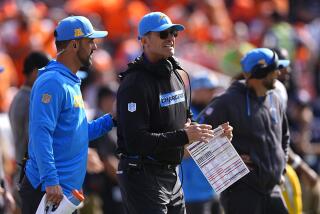President Should Be Able to Resume Normal Lifestyle, Cardiologists Say : Health: Doctors may need to adjust the dosage of two medications Bush is now taking. They will continue to monitor the rhythm of his heart.
- Share via
As heart disease goes, President Bush’s atrial fibrillation is relatively minor. But the President now will need to take medications at least several times a day and heed the advice of his physicians about his activities.
The situation is likely to create some uncertainty, both for Bush and for the American people.
At first, individuals diagnosed as having new ailments frequently seek to deny that the problem exists and try to resume their lives as if nothing happened. But over time, the reality of the new situation usually sinks in. Typically, they no longer feel invulnerable to disease and, at least subconsciously, adjust their thinking and routines.
“The history of patients who have atrial fibrillation is not entirely predictable, particularly when there is no obvious cause for it,” said Dr. Allan M. Ross, chief of cardiology at George Washington University Hospital in Washington and one of the President’s physicians.
Ross said that some individuals will have irregular heartbeats for a few days or a week and then “they’re gone as mysteriously as they arose.” Others will “be troubled from time to time.”
Most patients with atrial fibrillation can be successfully treated outside of the hospital. Cardiologists not connected with the case said that Bush’s two-day hospital stay was a prudent precaution, but added that similar patients are sometimes not even hospitalized.
Atrial fibrillation “is not a major league rhythm disturbance in any way,” said Dr. Bruce Lloyd III, the chief of cardiology at Bethesda Naval Medical Center and another of Bush’s physicians.
By Monday morning, the President’s heart rhythm had normalized after going in and out of atrial fibrillation Sunday night. He has had no sensation of the abnormal heart rhythm except when he experienced severe fatigue while jogging Saturday. Physicians said this was not uncommon.
“The odds that Bush will stay in a normal heart rhythm are quite high,” said Dr. Bruce McAuley, a Redwood City cardiologist affiliated with Stanford University. But McAuley cautioned that the President’s physicians “will only know with time whether the situation will recur.”
Cardiologists said Monday they expect Bush eventually will be able to resume his normal hectic and vigorous lifestyle without restriction.
“I’m sure he will be encouraged to continue exercising,” said Dr. George Bren, a cardiologist in private practice in Washington.
Bren and others said it was unlikely that Bush’s atrial fibrillation was caused by exercise, stress or fatigue. “There’s a lot of mystique about fatigue and what it does to the body, but there’s not a shred of evidence that suggests that fatigue or traveling too hard triggered his condition,” Bren said.
In some patients, however, recurrent atrial fibrillation is related to consumption of certain stimulants such as caffeine, or alcohol--neither of which has been indicated as a factor in the President’s case.
Bush, 66, appears to fall into the category of atrial fibrillation patients who are most likely to do well. The structure of his heart, as well as the heart valves and the heart muscle, all appear to be normal, as determined by echocardiograms, electrocardiograms and blood tests performed over the last several days.
In particular, patients with a normal size left atrium, where the chaotic impulse of atrial fibrillation often originates, have a very good chance of resuming a normal heartbeat.
When Bush first arrived at Bethesda Naval Medical Center on Saturday, his heart rate was in the “middle to upper 90s” as compared to his normal heart rate of about 70 beats per minute, his physicians said. Frequently, untreated atrial fibrillation patients have far faster heart rates--usually 130 beats per minute or more.
For now, Bush will be treated with two heart medicines--digoxin, which slows the heart rate, and procainamide, which helps prevent the heart from beating irregularly.
In addition, Bush has been taking an aspirin a day “for a period of time,” according to Dr. Burton Lee, the presidential physician, presumably to reduce his risk of suffering a heart attack.
Physicians may need to adjust the actual doses of the two prescription drugs on the basis of blood tests that measure their concentration in the bloodstream. In addition, Bush also will wear a small portable heart monitor at times so that his physicians can monitor his heart rhythm.
If the atrial fibrillation returns and persists for more than several days, Bush’s physicians are likely to consider either trying a medication other than procainamide or performing cardioversion, the use of an electrical shock to try to restore a normal heart rhythm.
Recurrent atrial fibrillation also would put the President at a slightly higher risk of having a stroke, as compared to a person his age who did not have the condition. Small blood clots can form in an irregularly contracting heart and sometimes these blood clots dislodge and travel through the circulatory system to the brain.
To minimize the risk of stroke, patients sometimes are placed on a blood thinning medicine, such as Coumadin. But the President’s physicians feel that such a prescription is not needed at this point.
“There has been no suggestion whatsoever that (stroke) is an immediate concern,” Ross said.
More to Read
Get the L.A. Times Politics newsletter
Deeply reported insights into legislation, politics and policy from Sacramento, Washington and beyond. In your inbox twice per week.
You may occasionally receive promotional content from the Los Angeles Times.










